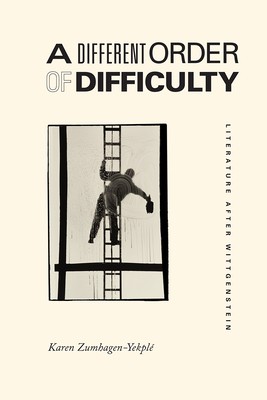| A Different Order of Difficulty: Literature After Wittgenstein Contributor(s): Zumhagen-Yekplé, Karen (Author) |
|
 |
ISBN: 022667715X ISBN-13: 9780226677156 Publisher: University of Chicago Press OUR PRICE: $34.65 Product Type: Paperback - Other Formats Published: March 2020 |
| Additional Information |
| BISAC Categories: - Literary Criticism | European - General - Philosophy | Aesthetics - Philosophy | History & Surveys - Modern |
| Dewey: 192 |
| LCCN: 2019032077 |
| Physical Information: 0.8" H x 6" W x 8.9" (1.05 lbs) 336 pages |
| Themes: - Chronological Period - Modern |
| Descriptions, Reviews, Etc. |
| Publisher Description: Is the point of philosophy to transmit beliefs about the world, or can it sometimes have higher ambitions? In this bold study, Karen Zumhagen-Yekpl makes a critical contribution to the "resolute" program of Wittgenstein scholarship, revealing his Tractatus Logico-Philosophicus as a complex, mock-theoretical puzzle designed to engage readers in the therapeutic self-clarification Wittgenstein saw as the true work of philosophy. Seen in this light, Wittgenstein resembles his modernist contemporaries more than might first appear. Like the literary innovators of his time, Wittgenstein believed in the productive power of difficulty, in varieties of spiritual experience, in the importance of age-old questions about life's meaning, and in the possibility of transfigurative shifts toward the right way of seeing the world. In a series of absorbing chapters, Zumhagen-Yekpl shows how Kafka, Woolf, Joyce, and Coetzee set their readers on a path toward a new way of being. Offering a new perspective on Wittgenstein as philosophical modernist, and on the lives and afterlives of his indirect teaching, A Different Order of Difficulty is a compelling addition to studies in both literature and philosophy. |
Contributor Bio(s): Zumhagen-Yekple, Karen: - Karen Zumhagen-Yekplé is assistant professor of English and an affiliated faculty member in the Stone Center for Latin American Studies and the Programs for Gender Studies and Film Studies at Tulane University. |